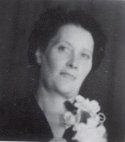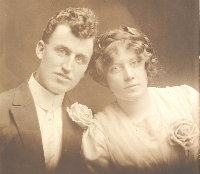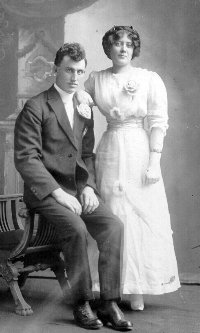 Mother came from a rather rigidly structured family, conduct-and/or deportment-wise. From my personal perspective, both parents were old-English vintage: steady, steadfast, punctual, mature, spotless of mind and body, patriarchally/matriarchy demanding–and equally paternally overflowing with love and devotion to the welfare of their children. Their daily activities centered around petitions of faith to that Eternal of, and to, whom we of the LDS-faith recognize and humbly render obeisance. Certainly, as regards Mom’s young womanhood, there could no uncertainty as to her wholesomeness come into question; and it was on this basis that Dad has expressed to me his courtship for her. A little excerpt, please, from one of his written comments to a granddaughter, Judy.
Mother came from a rather rigidly structured family, conduct-and/or deportment-wise. From my personal perspective, both parents were old-English vintage: steady, steadfast, punctual, mature, spotless of mind and body, patriarchally/matriarchy demanding–and equally paternally overflowing with love and devotion to the welfare of their children. Their daily activities centered around petitions of faith to that Eternal of, and to, whom we of the LDS-faith recognize and humbly render obeisance. Certainly, as regards Mom’s young womanhood, there could no uncertainty as to her wholesomeness come into question; and it was on this basis that Dad has expressed to me his courtship for her. A little excerpt, please, from one of his written comments to a granddaughter, Judy.
Ethel and I were born in the Grouse Creek Ward and grew up together and enjoyed the parties and dances together. It wasn’t long until we were drawn to each other and we were sure in our own minds we were meant for each other. It grew into a real love affair. I got a nice white top rig and a fine team and we went everywhere and enjoyed every event. Her mother didn’t like me because I wasn’t really religious. She tried to get her started with a returned missionary and he was willing but Ethel said, “Nothing doing.” As we went about we were pretty cocky and had a good time and loved each other dearly. It was not a problem of telling whether we were right or not. We were married on February 18, 1914, in the County Clerk’s Office in Ogden; by a minister named Jno V Bleuth.
Mother was preceded in the sibling roster by Eva (deceased early-on?), David, Mary, and LeRoy; Edward, William, and Heber followed her in lineage. Without reservation, I know how much mother loved and wished-well each of these dear ones. Many, many evenings, in the quite of the home have I sat at a distance, (presumably) absorbed in my own orbit, and overheard the discussions that Mom and Dad would entertain relative to the conduct and/or welfare of a given brother or sister in a given set of circumstances. As the years rolled by, particularly subsequent to Grandfather’s demise, there came into the family circle much rancor and an acrimonious essence most divisive to the cohesion that once existed. Believe me,Mother suffered much agony because of this, which followed, early-on the demise of her father in 1934 and also her younger brother, Heber, in 1934. (Add to this the fact that she had lost her own thirteen-year-old son in May of that same year.) Dad, bless his heart, did all that he could to support and comfort her in these months-upon-months of anguish, frustration, and despair–a story in itself. Even, “tender” as I was at that time, I recall tagging along with Dad as he tended the Frost home-ranches; irrigated the alfalfa, put up the hay at both the upper and lower places; rode the Grouse Creek mountains and Cotton Thomas Basin caring for the livestock. (As a matter-of-fact; it was on just such a junket, alongside the “over-the-mountains” road, where a little willow-laden, shallow stream trickled, that Dad and I stopped for lunch. He opened a can of Vienna sausages, the very first time that such a delicacy had crossed my lips. I thought that I was in seventh heaven for sure.)

Thomas Warburton & Ethel Frost Warburton
Grandmother Frost, too, suffered much anguish and frustration with the splintering of the family-timer (please excuse the aphorism). Regardless, her steadfastness that had maintained her through life’s vicissitudes surfaced and sustained her in the trials incident to liquidating the properties in the Grouse Creek valley. She retained her dignity, and though essentially estranged from her own sons and other living daughter, leaned toward the loving counsel and compassion of Mom and Dad. Of them all, it was she (and he) to whom Grandmother looked for ultimate assistance and direction; meaning, essentially, her departure-to, and welfare-while, living in Salt Lake City, and later, Brigham City.
Among my reminiscences: hauling wood in the old ‘38 chevy pickup off of Buckskin hill; feeding the livestock with her during the blizzards that raged while Dad was away on Company matters on Goose Creek; never! have I been out on some long-lasting-task–into the night–but what, when I came walking in the door, she was there to greet me and take the smart out of aches and pains of the day…always! a hot meal to sit down to and then a clean, warm (flat-iron wrapped in flannel) bed, and a loving pat on the shoulder or buss on the forehead; never, for so long as I lived under her tutelage, were my clothes not washed and pressed. (A little aside might be apropos here: Mom could take a portion-of-a-gallon of white-gas and dry-clean a suit to perfection. I don’t know of any other wife/mother doing the same.)
Of all the women in the valley, Mom had the misfortune (perhaps more cogently) of being married to a “prime mover.” This required that she, on manifold, numerous occasions! step forward and “plug-the-dike” when another of the Warburton-ladies was incapacitated. Specifically, do I allude to the countless hot summer days that she spent slaving over an even hotter cook-stove (at a brother-in-law’s house) preparing and serving meals, three times a day, large enough to feed ten-to-twenty hard working haymen. Others, of the five wives were ofttimes not able to meet the challenge because of illness; a large, small family; or, just plain didn’t feel disposed to be involved in such mundane, earthly consequences. Who else but the prime mover’s wife to step-in to fill the breech? Believe me, this she did–rest assured that it was done well! Mom just did not slight any undertaking, regardless….A recent communication from brother, Ernie, enclosed an epitome from an Ann Landers column entitled Class. Portions of it are iterated here to exemplify the character of this grand lady:
Class never runs scared.
It is sure footed and confident,
and it can handle whatever comes along.
…………………………………………
Class never makes excuses.
It takes its lumps and learns from past mistakes.
Class knows that good manners
are nothing more than a series of
small sacrifices and minor inconveniences.
…………………………………………..
Class is real.
You can’t fake it.
Class is comfortable in its own skin.
It never puts on airs.
…………………………………………..
Everyone is comfortable with the person
who has class because he is comfortable with himself.
Perhaps this is as good a time as any to mention that in spite of such vicissitudes, she had time to put on a cleanly washed and ironed, attractive dress over foundation garments that presented an alluring, mature woman. Her hair never–but never–was awry for more than a few moments. Her demeanor was, without exception, complimentary to the person with whom she conversed. A more selfless lady had never trodden this granite planet. Among her most endearing delights was the ability to make the home a warm, attractive reality; to facilitate the welfare and comfort of her husband; to raise, love, and nurture her “flock.”

Thomas & Clara Warburton
As older brothers and sisters left-the-nest, a piece of Mom’s heart went with them. On the occasions of their brief return, her arms were open and she radiated with ebullience and endearment. As the brief visit would end, and a beloved would depart again, try-as-she-might, her grief slipped through. I came to know (Perhaps perceive is a better word.)when she was on her knees scrubbing the floors by hand, and polishing the linoleum with wax (whether they needed it nor not). Good, hard, work seemed to be her sanctuary–and it worked! (Well I remember such an occasion. Whomever it was that had departed, followed-on that awful lonesomeness that has been my Achilles’-heel. As I stood brooding at the window in the living/dining room, the lightening scorched, and the thunder crackled, as the rain gushed down the pane. The house was dark, cold, and gloomy. I knew that I felt poorly, but I didn’t understand why. There, on her hands and knees, was Mom, giving that floor a workout like you wouldn’t believe. At that time, I didn’t really understand.) As the years rolled on, my perspective broadened and I came to appreciate the meaning of such.
Mondays were, always, wash-day. Earliest recollections have her standing over a tub full of hot water with an inclined scrub-board immersed therein. (“Rub-a-dub-dub, three men in a tub…” became a reality to me.) Washday or not, it was a favorite for me, ‘cause it was on these days that she didn’t take a lot of time to cook. Come noon-time and she would bring out the large bowl of bread-dough and cut off chunks to be flattened between her palms and then dropped into a pan of scalding lard (of her own rendering). No morsel since has the fond savor in my gustatory repertoire as that hot, golden fried-cake–slathered with butter and Karo syrup–put alongside a pile of brown-beans that had been simmering on the back of the cookstove. What a delicacy to me!
I’m not sure that I know how to put this next excerpt in delicately. So, we’ll just “call an ace-an-ace and a spade-a-spade.” In this day and age, can you imagine what fortitude it took to pile out of a warm bed, stick your feet into some cold, damp galoshes, wrap a mackinaw around you, and step out into the knee-deep snow to get to the “privy” an appreciable distance away?…Unthinkable, now, right?
To my understanding, Mom’s formal education terminated at the eighth-grade level. So it may have. Her education never ceased. She diligently applied herself to emulating the qualities, character, deportment, and modes of expression of those more-knowledgeable with whom she came in contact. Of the hundreds of letters that Mom has written to me over the years, each was a masterpiece in it’s own right: neat, in ink, legible, and forcefully expressive of day-to-day goings-on and her platitudes of endearment. (As I, now, peruse the compositions of [too many] lettered-personages they pale, comparatively, in most respects.)
By way of summation: I am indebted to Ernie for a most recent comment in one of his letters; I had overlooked a significant aspect of both Mom’s and Dad’s lives. His [Ernie’s] remonstration: “…I don’t think any history of Dad would ever be complete without the complimentary history of Mother.”…For sure! Likewise, with the other of our histories. If there is anything in them that depicts character, love, compassion, class, or ability, there-upon will you find Mom’s endorsement.
Ethel died on July 28, 1968.
Compiled by: R. Neal and R. Ernie Warburton
January 21, 1997
